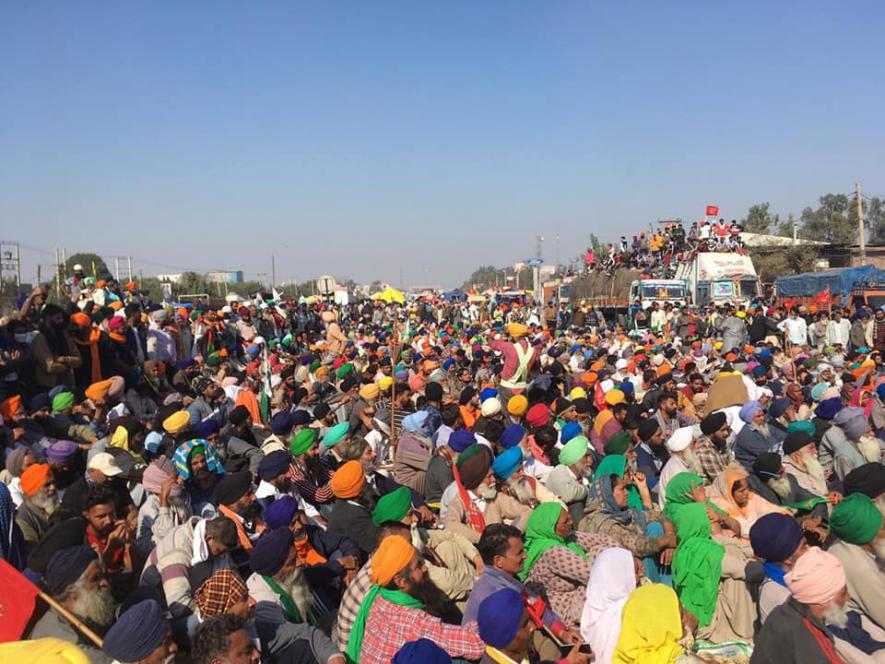‘Repeal Unconstitutional Farm Laws’: Civil Society, Women, and Rights Groups Support Farmers’ Protest

Protest site at Singhu border.
Demanding the withdrawal and repeal of the three new farm laws, civil society groups, women's groups, noted academics and others on Wednesday asked the Narendra Modi-led government to immediately promulgate an ordinance to stop the implementation of the laws, which have sparked protests by farmers across the country.
As farmers from neighbouring states of Delhi continued their protest at the national capital’s borders, 15 groups including All India Democratic Women’s Association (AIDWA), All India Peoples’ Science Network (AIPSN), All India Progressive Women’s Association (AIPWA),
Financial Accountability Network India (FAN India), Forum for Trade Justice, Janwadi Lekhak Sangh, Peoples Union for Civil Liberties, Nation for Farmers, Right to Food Campaign, among others, extended their solidarity to the protests. They also sought the withdrawal of all cases imposed on the protesting farmers and leaders of farmers’ organisations.
Condemning the way security forces cracked down on protesting farmers with water cannons and tear gas, MG Devasahayam, Former Chief Secretary at Government of Haryana, said, “Using of water cannons on farmers was barbarian. It is winter and 60-70 years old people are there.”
“Dissent is by definition going to break designated spaces and the farmers are doing that.” said P Sainath, senior journalist and the founding editor of People's Archive of Rural India, in the press conference arranged by the organisations. He criticised the Supreme Court verdict that dissent must be confined to designated.
In September, the three “anti-farmer” laws were passed leading to the present protests. The laws are--Farmers’ Produce Trade and Commerce (Promotion and Facilitation) Act, 2020 (FPTC ACT); the Farmers (Empowerment and Protection) Agreement on Price Assurance and Farm Services Act, 2020, and the Essential Commodities (Amendment) Act, 2020.
“Why were these laws passed at the height of the pandemic when the government had other responsibilities? They believed that if you smash through these reforms at this time, the workers and farmers would not be in a position to organise against them,” Sainath said, adding that the protests proved such assumptions wrong.
The speakers called all progressive and democratic organisations and individuals to support the farmers’ struggle. “We are standing with farmers because it is not just their struggle. They are fighting for everyone. It is a struggle for food protection and democracy,” said Kavita Krishnan of AIDWA.
Criticising the view that there is a miscommunication between the Centre and the farmers regarding the farm laws, Krishnan asked, “How will the government tell the farmers what is farming? How will they explain the laws to them?” The protesting farmers, including women, understand the laws affecting them well, she said.
“We believe that these laws will lead to further landlessness and destitution because the laws permit the unsparing loot by the lobby of corporate producers. The Government is also under pressure from the United States and other developed market economies in the World Trade Organization (WTO) to dismantle the subsidy regime and the public procurement and public distribution systems put in place in Punjab, Haryana, Uttar Pradesh, Maharashtra, Karnataka and many other states. The government needs to state its position on the subsidy regime and the public food distribution system,” a joint statement by the organisations said. “While India has taken progressive positions at the WTO to withstand the pressure of developed countries so far and argued for a ‘peace clause’ to defend its public stockholding of food, the passing of the new farm laws gives an opposite impression,” it added.
Accusing the government of giving resources and infrastructure to oligarchs through such laws as the farm acts, Devasahayam said, “There is a massive effort going on to bring in oligopolies (few important sellers) and oligopsony (few buyers, many sellers).”
“The three laws must go and the government must opt for the triple pricing system,” he said, explaining ‘triple pricing’ as “parity price, where farmers get remunerative prices; support price, below which prices will not drop; intervention price, where govt will intervene in case of high prices leading to food inflation.” The ‘triple pricing’ was also recommended to the then government by the “Report of the High-Powered Committee on Agricultural Policies and Programmes-1990”.
The laws were criticised for being “undemocratic” and “unconstitutional” as well.
'Agriculture a State Subject'
Within India’s federal structure, legislative powers are distributed between the Centre and states through the Seventh Schedule to the Constitution containing a Union list, a state list and a concurrent list.
Agriculture (Entry 14 in state list) and all its associated enterprises are a state subject. However, Entry 26 of state list (trade and commerce within the State) and Entry 27 (production, supply and distribution of goods) are also subject to Entry 33 on the concurrent list. This Entry 33 lets the Union government control production, supply and distribution of “(b) foodstuffs, including edible oilseeds and oils; (c) cattle fodder, including oilcakes and other concentrates; (d) raw cotton whether ginned or unginned, and cotton seeds; and (e) raw jute.” This provision has been used by the Centre to bring in the farm laws.
Criticising this “loophole” used by the Centre, Professor R Ramakumar from Tata Institute of Social Sciences said when agriculture is exclusively a state subject, then all its ancillary and subsidiary enterprises in the state list should also be under the exclusive legislative domain of states. He termed the government’s move to introduce the laws as “legislative adventurism” and added that there is scope for these laws to be challenged in the Supreme Court.
Ramakumar and Devasahayam, among others suggested the Union government should in consultation with states allow customised legislations to emerge while scrapping the controversial triad of farm laws.
“Agriculture is a state subject. The Government of India has no business making these laws. I am from Tamil Nadu and served in Punjab and Haryana – and agriculture in these places are very different,” Devasahayam said.
‘False Claims of Govt’
Ramakumar also said, “The government says farmers will (through the new laws) have freedom in selling their produce, get higher prices and the middle man will disappear. These are unfounded claims and it’s not going to happen. Many studies and research show that larger number of farmers already sell outside of APMC to private traders.”
Because of these laws, both farmers and consumers will be left to the mercy of the corporations with regards to selling produce or buying food, he said.
Commenting on the Farmers (Empowerment and Protection) Agreement on Price Assurance and Farm Services Act, 2020, which has been criticised for providing a legal basis to the existing practice of contract farming, Ramakumar said, “We need good regulation for contract farming. The matter should have been left to the legislative domain of states.”
Praveen Jha, professor at Jawaharlal Nehru University, said, “Because of contract farming, if we see what happened in other countries in last 40-50 years, farming has become unviable.”
Jha, who specialises in labour and agricultural economics, termed the farm laws as a “public policy driven crime inflicted on the agricultural sector.” Criticising the FPTC law that has been accused of weakening the Agricultural Produce Market Committee (APMC)-led mandi system where farmers sell their produce, he said, “It was important to finish APMC’s to give power to the capitalists.”
“These laws have been brought in to turn farmers into beggars. Farmers understand that,” said Annie Raja, leader of the Communist Party of India and the general secretary of National Federation of Indian Women (NFIW). “There is no recognition of women farmers or agricultural workers in these three bills. The system of agreements for cultivation and trade is very detrimental to small farmers, especially women farmers. The corporate agents will behave worse with women. The grievance redressal system does not have gender sensitivity. Moreover, the laws ensure that you can’t file case against the Centre or state governments,” she said.
Criticising the removal of cereals, pulses, edible oils, onion and potatoes etc. from the list of essential commodities, Annie Raja said it will further hurt the nutrition of rural women. “Universalised public distribution system with all essential commodities is the need of the hour,” she added.
The organisations in their statement also demanded immediate grant of loan waivers for farmers, especially widows of farmers who have committed suicide and those who have taken loans from microfinance companies and SHGs. Besides, they demanded monthly income support to vulnerable families, implementation of MNREGA and of universal social security support systems, which includes support for healthcare and education of farmers.
In solidarity to the farmers protesting at the Delhi border, Maharashtra farmers will hold massive protests on Thursday, said Mariam Dhawale of AIDWA. She added that women's groups are collection foodgrain in Haryana to send to protesting farmers stuck at the borders of Delhi.
Get the latest reports & analysis with people's perspective on Protests, movements & deep analytical videos, discussions of the current affairs in your Telegram app. Subscribe to NewsClick's Telegram channel & get Real-Time updates on stories, as they get published on our website.
























